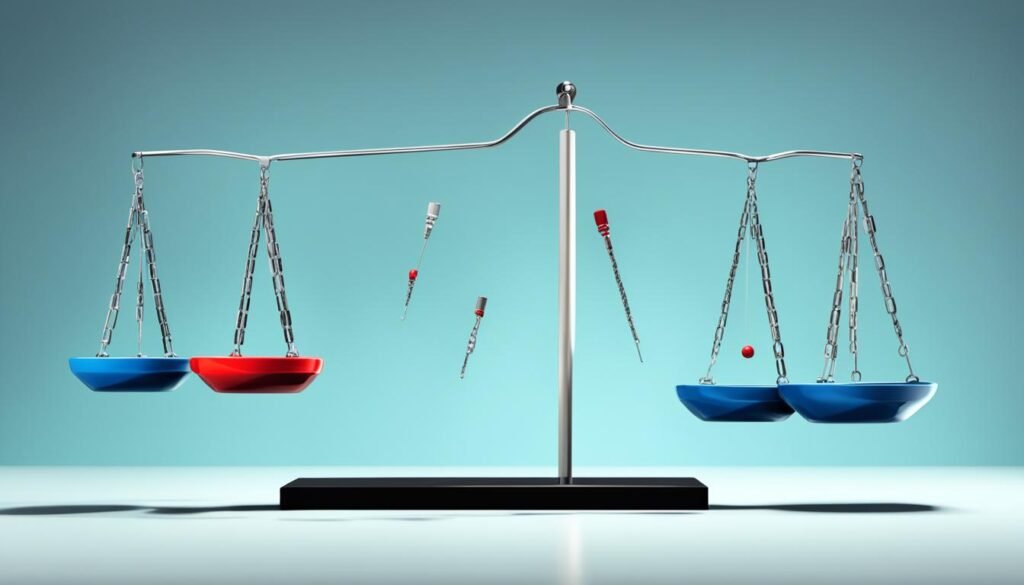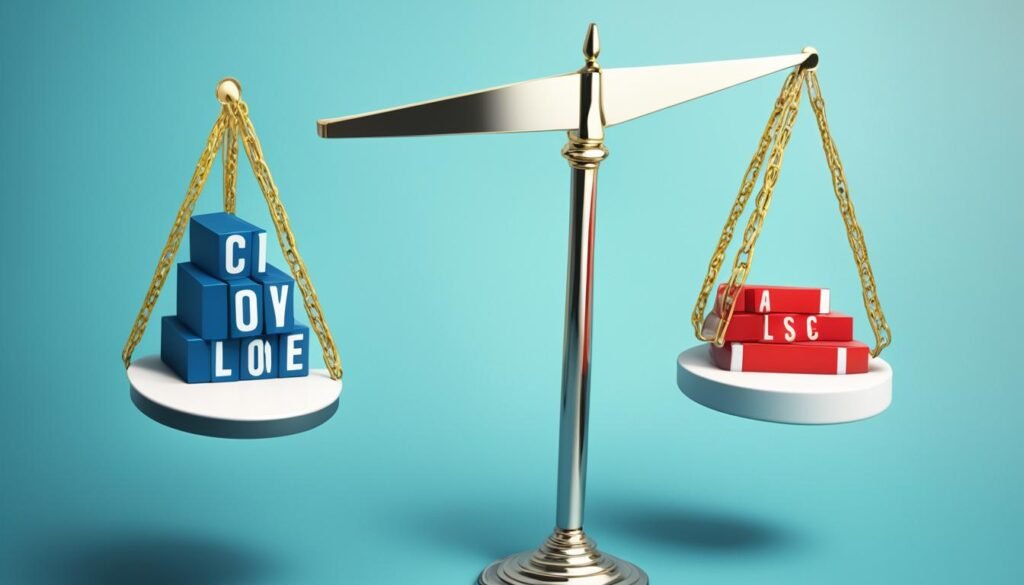Did you know workplace injuries can cause big financial problems? When people get hurt and can’t work, it hits their wallet hard. It messes with their income and financial security.
Injuries don’t just bring medical bills. They also mean missing work and losing money. Over time, this can lead to serious money troubles.
It makes it hard to pay the bills.
It’s important to know how injuries affect your ability to earn money. When you look for compensation, this knowledge is key. You’ll need to look at how much money you might make later, too.
Key Takeaways:
- Workplace injuries can lead to significant financial loss, impacting income and overall financial stability.
- Missed work and reduced job prospects can result in an immediate loss of income.
- Injuries can also hinder future earning potential and contribute to injury-related financial stress.
- Accurate assessment of the impact on earning capacity is crucial when seeking compensation.
- Evaluations consider current and future income projections, labor market conditions, and potential career shifts.
Understanding Loss of Earning Capacity
Getting hurt or sick can affect your future money-making ability. This is called “loss of earning capacity.” It happens when you can’t go back to your old job or have to take lower-paying jobs. It’s key to know how this is different from losing income when you want compensation.
Loss of income is about the money you didn’t make because of your injury. This includes wages you missed out on. Loss of earning capacity, however, is about the money you won’t be able to make in the future because of your injury. It looks at what you could have earned if you weren’t injured.
When you can’t go back to work or have to take a lower-paying job, your future earnings can be majorly impacted. This is when vocational experts matter a lot. They help figure out your loss of earning capacity and the compensation you should get.
Vocational experts are pros at assessing how well you can work and make money. They look at your work history, education, skills, and the job market. They conduct detailed earning capacity assessments. This helps support your claim for compensation for your lost earning ability.
Evaluating Future Earning Capacity
Evaluating your future earning ability means looking at how the injury affects your money-making potential. This includes considering:
- The nature and severity of your injury
- Any physical or cognitive limitations from the injury
- If you can still do your old job
- If there are other suitable jobs for you
- Chances for retraining or more education to get better jobs
Using this info, vocational experts estimate your loss of earning capacity. They see how your injury has impacted your future work and earnings, including if you can get back to your old job or find a similar one.
By showing strong evidence of how your injury affects your future earnings, vocational experts help you get fair compensation for your lost earning ability.
Compensation for Loss of Earning Capacity
Compensation for lost earning ability is vital in personal injury claims. It helps cover the income you can’t make because of your injury. The compensation takes into account the difference between your earnings before the injury and what you can make now.
Figuring out the right compensation for lost earning ability is complex. It needs a deep understanding of your earnings before the injury, your current abilities, and the job market. Vocational experts are key in giving accurate assessments and opinions on how your injury affects your future earning ability.
Having solid evidence of lost earning ability, supported by vocational expert assessments, makes your compensation claim stronger. It helps you get a fair amount to cover the financial impact your injury has on your future earnings.
Earning Capacity Assessments and Their Importance
Earning capacity assessments are key in calculating compensation for lost earning ability in personal injury cases. These evaluations look at how well a person can earn money before and after an injury. Vocational experts do these assessments, taking into account many factors to accurately figure out lost income.
Vocational experts review work history, education, certifications, and current job market trends. This helps them understand an individual’s ability to work and the impact on their earnings. This method ensures a precise loss of earning capacity is determined.
These assessments are not just for personal injury cases. They matter in labor and family law too. They’re used to figure out money damages in wrongful death and divorce cases, showing how crucial they are.
An assessment by a vocational expert guarantees a fair and knowledgeable evaluation. Their skills in evaluating how an injury affects future earnings are important. This helps figure out the right compensation.
Vocational expert evaluations give personal injury cases detailed insights into the financial impact of an injury. They provide important evidence for compensation claims and financial loss evaluations.
Earning capacity assessments are vital for lawyers and legal professionals. They ensure clients get a fair compensation for their lost earning ability. Understanding the role of vocational expert evaluations in personal injury cases is crucial for fair justice.
Factors Considered in Assessing Loss of Earnings Capacity
To find out how an injury affects earning ability, experts look at several factors. They check the person’s education, job history, earnings so far, and the job market’s condition.
An individual’s prior schooling is key to figuring out possible earnings. The expert looks at the person’s highest level of education. They also check for any special certifications, licenses, or training that could affect job chances and pay.
The person’s work experience is very important too. The vocational expert reviews how the individual’s career has grown, any promotions, and what they used to earn. They need a good grasp of the person’s job duties, skills, and experience to make an accurate assessment.
Studying the job market is critical to understand its impact on future earnings. The expert assesses trends in the market, the demand in different industries, and jobs available around the person’s area. This helps figure out if the person can still find work and how the injury might change their job options.
When a person can still work but has to change jobs or take a lower-paying one because of their injury, an expert calculates this loss. They look at how the injury changes the person’s ability to earn compared to what they could have made without the injury.
Reviewing all these points gives a clear picture of how an injury affects someone’s ability to earn money. Experts consider the person’s education, job experience, the job market, and possible job changes. This helps them give a detailed report on lost earnings, ensuring the injured person gets fair compensation.

Factors Considered in Assessing Loss of Earnings Capacity
| Factors | Description |
|---|---|
| Education | Analyzing the individual’s educational background, certifications, licenses, and specialized training to assess their impact on future job prospects and earning potential. |
| Work History | Evaluating the individual’s career progression, promotions, previous wages, and job responsibilities to establish a baseline for future earning potential. |
| Analysis of the Labor Market | Considering current market trends, industry demands, job availability, and geographical factors to estimate the individual’s employability and the potential impact of the injury on job prospects. |
| Job Shift and Lower-Paying Job | Calculating the difference in earning capacity when an individual is capable of working but must shift to a different occupation or accept a lower-paying job due to the injury. |
Compensation for Loss of Earning Capacity
Individuals hurt and unable to earn as before may get compensation. This support covers future income losses. Proving this need not be overly hard. It must be shown with pretty good certainty.
Certified experts assess injury impacts to decide compensation. These professionals look at education, past work, and the job market. Their insights show how much earning capacity has been lost.
Their findings, alongside medical costs and pain assessments, help set fair compensation. A vocational expert’s input makes a claim stronger. It also raises the chance of getting a fair money reward.
“Earning capacity assessments conducted by certified vocational experts are considered legitimate evidence in personal injury cases.”
The role of vocational experts in these cases is crucial. They add trustworthiness to claims with their assessments. They figure out how injuries affect future earnings. This helps the hurt party get the compensation they deserve. Their work is key to financial recovery after an injury.
Importance of Vocational Expert in Personal Injury Cases
A vocational expert brings a lot of value to injury cases. They look at earning capacity loss in a professional, objective way. Their work backs up the injured person’s claim. They focus on:
- Conducting comprehensive earning capacity assessments
- Evaluating the impact of an injury on an individual’s ability to work
- Considering educational background, work history, and the labor market
- Providing expert testimony in legal proceedings
- Strengthening the validity and credibility of compensation claims

| Benefits of a Vocational Expert | Role of a Vocational Expert |
|---|---|
| 1. Accurate assessment of injury’s impact on future earning potential. | 1. Conducting objective earning capacity assessments. |
| 2. Enhancing the credibility of compensation claims. | 2. Evaluating educational background and work history. |
| 3. Contributing to the overall recovery and rebuilding process. | 3. Analyzing the labor market trends. |
| 4. Strengthening the validity of compensation claims. | 4. Providing expert testimony in legal proceedings. |
Their testimony and evaluations are critical in injury cases. Their expertise influences how much compensation the injured get. This ensures victims are fairly compensated for their earning capacity loss.
Conclusion
A personal injury can majorly affect your money flow and ability to earn. It’s important to handle the money recovery part well and fight for what you’re owed. This is where the Super Attorneys Of Irvine step in to help those hurt.
Working with experienced pros helps you go after what you deserve for workplace injuries. They know how to move through legal stuff and fight for your rights. This can really help get your finances back on track.
Don’t let an injury wreck your financial life. The Super Attorneys Of Irvine can help you get back on solid ground. They give you the support and know-how you need. To start getting better, reach out to them today.

